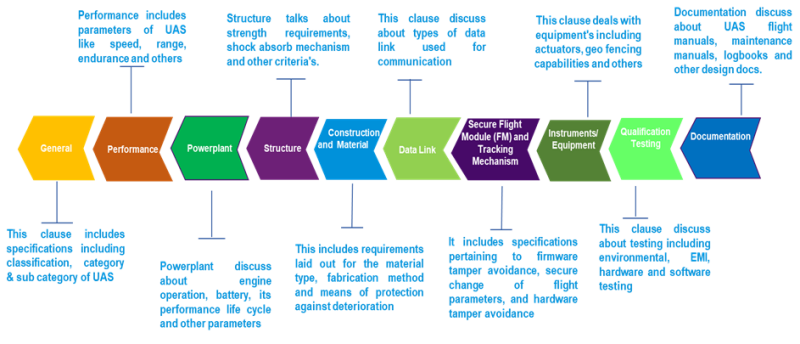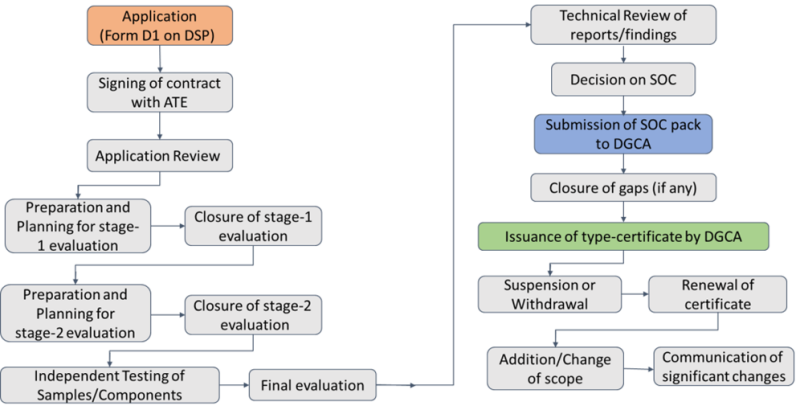A drone or unmanned aircraft system (UAS), functions without a human onboard and can be operated remotely from the ground. Although initially linked to military purposes, these unmanned aerial vehicles have become increasingly prevalent in civilian and commercial fields. Their applications range widely encompassing surveying, wildlife management, agriculture, disaster response and photography, with their uses continually expanding.
 The Indian government is actively promoting the use of drones by relaxing regulations and introducing performance-linked incentives (PLI) for manufacturers. The PLI Scheme for drones and their components is strategically crafted to support the industry in its strategic, tactical and operational implementations of this transformative technology. Drones have become essential to various government schemes and projects, leading to a significant increase in demand for drone technology and services. The burgeoning concept of "Drone as a Service" is gaining substantial momentum across sectors. This approach aims to streamline India's diverse drone industry by fostering collaboration between manufacturers and service providers. By advocating for this service-oriented model, the goal is to bring cohesion to the fragmented drone landscape, promoting synergy and innovation in the industry.
The Indian government is actively promoting the use of drones by relaxing regulations and introducing performance-linked incentives (PLI) for manufacturers. The PLI Scheme for drones and their components is strategically crafted to support the industry in its strategic, tactical and operational implementations of this transformative technology. Drones have become essential to various government schemes and projects, leading to a significant increase in demand for drone technology and services. The burgeoning concept of "Drone as a Service" is gaining substantial momentum across sectors. This approach aims to streamline India's diverse drone industry by fostering collaboration between manufacturers and service providers. By advocating for this service-oriented model, the goal is to bring cohesion to the fragmented drone landscape, promoting synergy and innovation in the industry.
On August 25, 2021, the Government of India's Ministry of Civil Aviation introduced "The Drone Rules 2021," which mandated the requirement for a type certificate for drones. This pivotal measure facilitated the development of a globally accredited certification framework for drones, with the objective of responsibly expanding the commercial applications of diverse drone technologies while implementing necessary safeguards.
The implementation of the type certification process underscores the government's commitment to nurture a robust ecosystem for drones. With certification, drones are now authorized to operate for various commercial purposes within the specified regulatory framework. The Directorate General of Civil Aviation (DGCA), an agency under the Ministry of Civil Aviation, formalized this initiative by entering into a Memorandum of Understanding with the Quality Council of India (QCI), an autonomous body established by the Government of India. This collaboration was dedicated to develop and operate the Certification Scheme for Unmanned Aircraft Systems (CSUAS), aligning with evolving rules, regulations and procedures. This structured process ensures that Unmanned Aircraft Systems (UAS) adhere to relevant regulatory requirements, guaranteeing both domestic compliance and international equivalence. Through this, the government aims to facilitate the responsible growth of the drone industry while upholding a high standard of safety and regulatory adherence.
The Certification Scheme for Unmanned Aircraft Systems (CSUAS) is a crucial factor in enhancing the competitiveness of the Indian drone industry. It underscores the significance of a conformity assessment framework that is based on parameters like quality, reliability, and safety of drones. This framework was officially gazette notified by the Ministry of Civil Aviation on January 26, 2022, in alignment with the provisions outlined in the Drone Rules 2021. CSUAS is structured in accordance with the ISO/IEC 17065 product certification requirements.
In the present scenario, India features a diverse range of drone-based startups, predominantly involved in either offering drone-based services or manufacturing drones. The industry is witnessing substantial growth, marked by a notable increase in demand. The type certification process serves as a valuable mechanism for Indian drone manufacturers, enabling them to create top-notch products adhering to rigorous quality and safety standards. This strategic approach positions Indian drone manufacturers not only to fulfill domestic needs but also to compete globally and to support the Make in India initiative.
Drones have broadened their scope beyond surveying and photography, making notable advancements in agricultural practices. They are now integral to farming activities such as spraying insecticides or pesticides and conducting assessments of crop health. In India, farmers are eagerly adopting this technology to substantially decrease spraying time and mitigate human exposure to harmful pesticides and insecticides. The Certification Scheme for Unmanned Aircraft Systems (CSUAS) outlines the ten clauses or criteria for certification, along with the categorization and classification of drones in accordance with The Drones Rules 2021.

The above image showcases the ten clauses on which drones are being certified. These criteria involve a detailed assessment of parameters such as performance, battery, structure, data link testing and other specified factors as outlined in the certification scheme. This thorough evaluation is essential to verify that drones adhere to the necessary standards.
The assessment process is carried out in two stages by Certification Bodies (CBs), or Authorized Testing Entities (ATEs) being approved by Quality Council of India. In the initial stage, emphasis is placed on document verification including design documents and all other pertinent paperwork. In the second stage, a meticulous check of physical parameters is conducted, aligning with the submitted documents and encompassing the overall physical condition of the drone. This phase also includes a flight test to verify the drone's performance and adherence to certification requirements. Upon completion of both stages, the respective CB submits a Statement of Conformity (SoC) to the DGCA for further issuance of Type Certificate.

The certification process is outlined in the above flowchart, demonstrating how manufacturers can commence Type Certification by submitting Form D1 through a Digital Portal. Overseen by the DGCA, the Digital Portal functions as an all-encompassing solution for all drone-related activities in India. The entire certification procedure has been digitized, enabling real-time tracking of Form D1 progress on the Digital Sky Platform.
The significance of quality is paramount in influencing the development and lifespan of a product. The Certification Scheme for Unmanned Aircraft Systems (CSUAS) represents a vital step in India's pursuit of becoming a Global Drone Hub by 2030, aligning with the vision of an Atmanirbhar Bharat (“self-reliant India”).


About the Authors:
CS Sharma is Joint Director, Quality Council of India. Roanak Kumar is Associate Manager, Quality Council of India.
















Comments